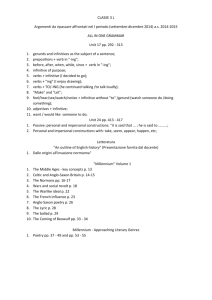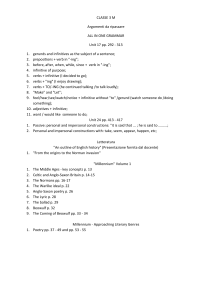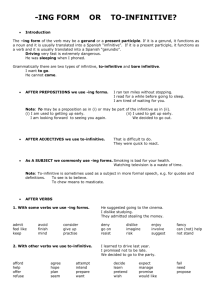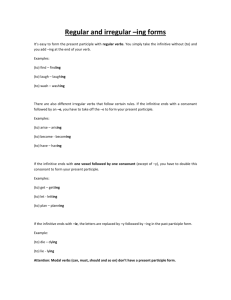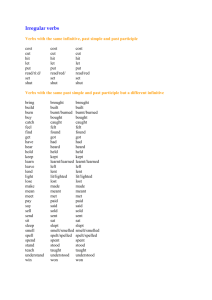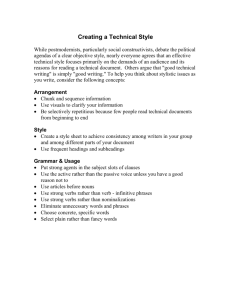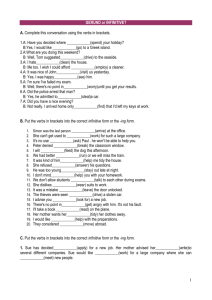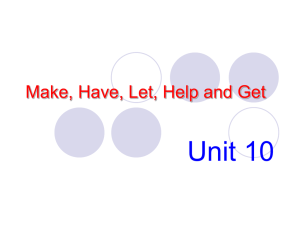ing-infclauses6
advertisement
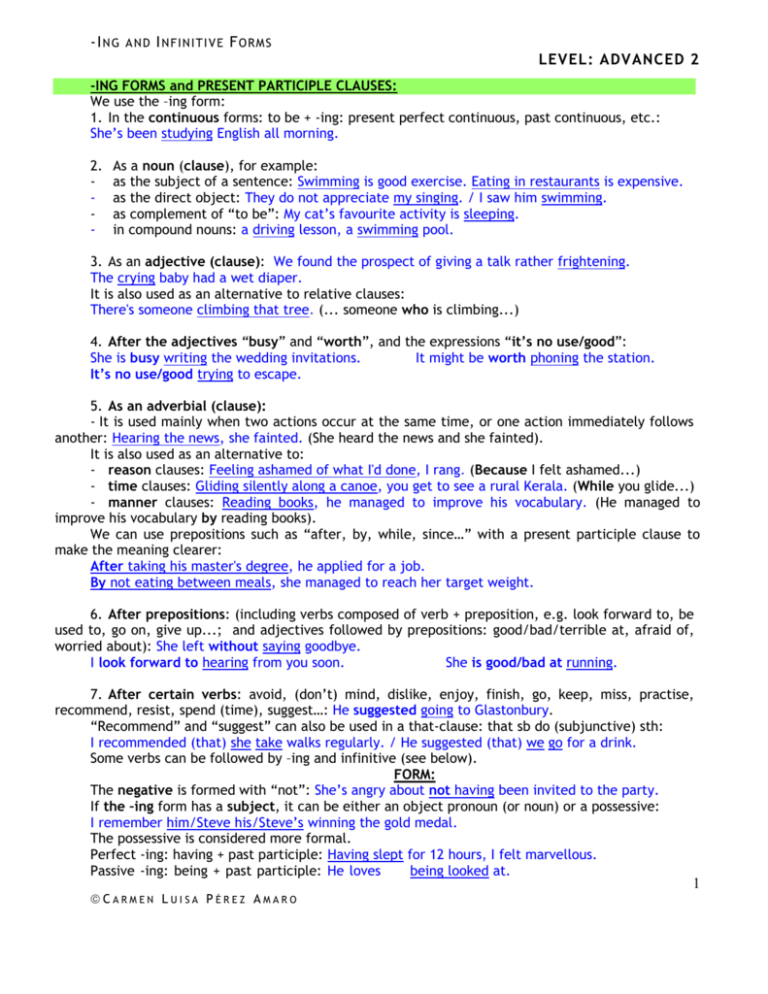
-I N G A N D I N FI N I T I V E F OR M S LEVEL: ADVANCED 2 -ING FORMS and PRESENT PARTICIPLE CLAUSES: We use the –ing form: 1. In the continuous forms: to be + -ing: present perfect continuous, past continuous, etc.: She’s been studying English all morning. 2. - As a noun (clause), for example: as the subject of a sentence: Swimming is good exercise. Eating in restaurants is expensive. as the direct object: They do not appreciate my singing. / I saw him swimming. as complement of “to be”: My cat’s favourite activity is sleeping. in compound nouns: a driving lesson, a swimming pool. 3. As an adjective (clause): We found the prospect of giving a talk rather frightening. The crying baby had a wet diaper. It is also used as an alternative to relative clauses: There's someone climbing that tree. (... someone who is climbing...) 4. After the adjectives “busy” and “worth”, and the expressions “it’s no use/good”: She is busy writing the wedding invitations. It might be worth phoning the station. It’s no use/good trying to escape. 5. As an adverbial (clause): - It is used mainly when two actions occur at the same time, or one action immediately follows another: Hearing the news, she fainted. (She heard the news and she fainted). It is also used as an alternative to: - reason clauses: Feeling ashamed of what I'd done, I rang. (Because I felt ashamed...) - time clauses: Gliding silently along a canoe, you get to see a rural Kerala. (While you glide...) - manner clauses: Reading books, he managed to improve his vocabulary. (He managed to improve his vocabulary by reading books). We can use prepositions such as “after, by, while, since…” with a present participle clause to make the meaning clearer: After taking his master's degree, he applied for a job. By not eating between meals, she managed to reach her target weight. 6. After prepositions: (including verbs composed of verb + preposition, e.g. look forward to, be used to, go on, give up...; and adjectives followed by prepositions: good/bad/terrible at, afraid of, worried about): She left without saying goodbye. I look forward to hearing from you soon. She is good/bad at running. 7. After certain verbs: avoid, (don’t) mind, dislike, enjoy, finish, go, keep, miss, practise, recommend, resist, spend (time), suggest…: He suggested going to Glastonbury. “Recommend” and “suggest” can also be used in a that-clause: that sb do (subjunctive) sth: I recommended (that) she take walks regularly. / He suggested (that) we go for a drink. Some verbs can be followed by –ing and infinitive (see below). FORM: The negative is formed with “not”: She’s angry about not having been invited to the party. If the –ing form has a subject, it can be either an object pronoun (or noun) or a possessive: I remember him/Steve his/Steve’s winning the gold medal. The possessive is considered more formal. Perfect -ing: having + past participle: Having slept for 12 hours, I felt marvellous. Passive -ing: being + past participle: He loves being looked at. CARMEN LUISA PÉREZ AMARO 1 -I N G A N D I N FI N I T I V E F OR M S LEVEL: ADVANCED 2 TO-INFINITIVE and TO- INFINITIVE CLAUSES: We use the to-infinitive: 1. As a noun, for example: - as the subject of a sentence: To watch him eating gets on my nerves. - as the direct object: I don’t want to talk. - as complement of “to be”: My ambition is to retire at forty. Sentences like this can also be introduced with introductory/anticipatory “it”: It is my ambition to retire at forty. 2. After most adjectives (e.g. afraid, difficult, easy, important, impossible, nice, better…): The recipe is easy to follow. Mum will be glad to have you at home. 3. After nouns: You have the right to remain silent. 4. To indicate purpose or reason, i.e. to say why we do sth: I went out to buy some milk./ To improve your compositions, you must consider your audience. 5. After certain verbs: advise*, allow*, ask*, agree, be able, be allowed, be going (future), can’t afford, convince*, decide, encourage*, expect*, force*, have (obligation), help*, hope, invite*, learn, manage, oblige*, offer, order*, ought, pay*, permit*, persuade*, plan, pretend, promise*, refuse, seem, teach*, tell*, want*, would like*, would love*, would hate*, would prefer*. Verbs with an asterisk can be/are followed by an object + to-infinitive: He advised me to buy it. She wants him to go with her. I'd hate you to go. Some verbs can be followed by to-infinitive and –ing (see below). FORM: The negative of the to-infinitive is formed with “not”: Try not to be late. If the infinitive has a subject, it is introduced with the preposition “for”+ noun/object pronoun: For him to complain about his work is ridiculous. It’s impossible for her/for Mary to arrive at 7 o’clock. Perfect to-infinitive: to have + past participle: It’s nice to have finished work. Progressive to-infinitive: to be + ing: It’s nice to be sitting here with you. Passive to-infinitive: to be + past participle: There’s a lot of work to be done. Perfect progressive to-infinitive: to have been + ing: I’d like to have been sitting there when she walked in. Perfect passive to-infinitive: to have been + past participle: The building is said to have been built two years ago. ZERO INFINITIVE: We use the zero infinitive: 1. After certain verbs: can, could, may, might, must, should, shall, will, would (all modal verbs except “ought + to infinitive”); do, had better, help*, let*, make*, would rather, would sooner: Jane may not come tomorrow. Can you help me? Do you like chocolate? I’d better put the meat in the oven. I'd rather/sooner not work in the evenings. Verbs with an asterisk are followed by an object + zero infinitive: He lets his children stay up really late. Our boss makes us work late. “Help” can be used followed by to-infinitive or zero infinitive: Can you help me (to) unload the car? Some verbs can be followed by zero infinitive and –ing (see below). 2. After “why (not)”: Why pay more at other shops? Why not take a holiday? 3. After “what” cleft sentences: especially the clauses that begin with the following structures (to-infinitive is also possible): What I do is…: What I do if I get stressed is (to) talk to my friends. What a fire-door does is (to) delay the spread of a fire. All I did was…: All I did was (to) give him a little push. CARMEN LUISA PÉREZ AMARO 2 -I N G A N D I N FI N I T I V E F OR M S LEVEL: ADVANCED 2 FORM: Progressive infinitive: be + ing: This time tomorrow I’ll be lying on the beach. Perfect infinitive: have + past participle: You should have told me you were coming. Passive infinitive: be + past participle: That window must be repaired before tonight. Perfect progressive infinitive: have been + ing: You must have been sitting there for long. Perfect passive infinitive: have been + past participle: You could have been killed. VERBS + INFINITIVE and –ING: Verbs + to infinitive and –ing with little or no difference in meaning: attempt, be accustomed to, begin, can’t bear, continue, hate, intend, like, love, prefer, start. I’m not accustomed to giving/ give personal information about myself to strangers. I began watching/ to watch soaps while I was ill at home. I intend telling/ to tell her what I think. “Like, love, hate, prefer” are usually followed by an –ing form when the meaning is general (the emphasis is on the enjoyment or not of the action), and by a to-infinitive when they refer to a particular time or situation (when extra information is given): I prefer eating out to eating at home. I prefer to eat out on Saturdays. These verbs can be followed by an object + to-infinitive/ing: Jenny's mother hates her staying out late. / We like our students to take part in sports activities. Verbs + to infinitive and –ing with difference in meaning: forget/remember, go on, mean, need, regret, stop, try, used. 1. “Forget, remember”: + to inf: The infinitive refers to things that happen after you remember or forget. I must remember to write to him. (=I must remember first, and then write to him). I forgot to meet my wife at the station.(=First I forgot, then I didn’t meet her because I forgot). + -ing: for memories of the past. Typical expression: I’ll never forget … + ing. The –ing form refers to things that happen before you remember or forget. I remember writing to him last week. (=I wrote to him last week). I’ll never forget meeting her for the first time. (=I’ll never forget it). 2. “Go on”: + to inf: to do sth after you have finished doing sth else: She went on to become a successful surgeon. + -ing: to continue doing sth: He went on working until he was 91. 3. “Mean”: + to inf: intend: I didn’t mean to upset you. + -ing: involve/necessitate: Dieting also means being careful about which foods you buy. 4. “Need”: + to inf: “you must do something” (active meaning): You need to clean the car. + -ing: “something must be done” (passive meaning): Your car needs cleaning. 5. “Regret”: + to inf: “I’m sorry about what I’m about to say” (formal): I regret to inform you that your contract will not be renewed. + -ing: “I’m sorry for what’s already happened”: I regret leaving school so young. CARMEN LUISA PÉREZ AMARO 3 -I N G A N D I N FI N I T I V E F OR M S LEVEL: ADVANCED 2 6. “Stop”: + to inf: means to interrupt an activity in order to do something else, so the infinitive is used to express a purpose: I stopped to have lunch. (=in order to have lunch) + -ing: means to finish an action: I stopped working for them because the wages were so low. 7. “Try”: + to inf: means to make an effort to do something. It may be something very difficult or even impossible: The surgeons tried to save his life but he died on the operating table. + -ing: means to experiment with an action that might be a solution to your problem. If you have problems sleeping, you could try doing some yoga before you go to bed. 8. “Used”: 1. Used + to infinitive is used to talk about past habits and situations: I used to work hard (=Now I don’t). 2. Be used to + ing means "be accustomed to": I’m used to working hard. (=I’m accustomed). Some verbs of the senses (hear, see, notice, watch) can be followed by object + zero infinitive and object + –ing with difference in meaning: + zero inf: the infinitive suggests that we hear/see the whole of the action: I saw Mary cross the road and disappear into the post office. I once heard Brendel play all the Beethoven concertos. + -ing: the -ing suggests that we hear/see sth in progress: I looked out of the window and saw Mary crossing the road. As I passed his house I heard him practising the piano. CARMEN LUISA PÉREZ AMARO 4
